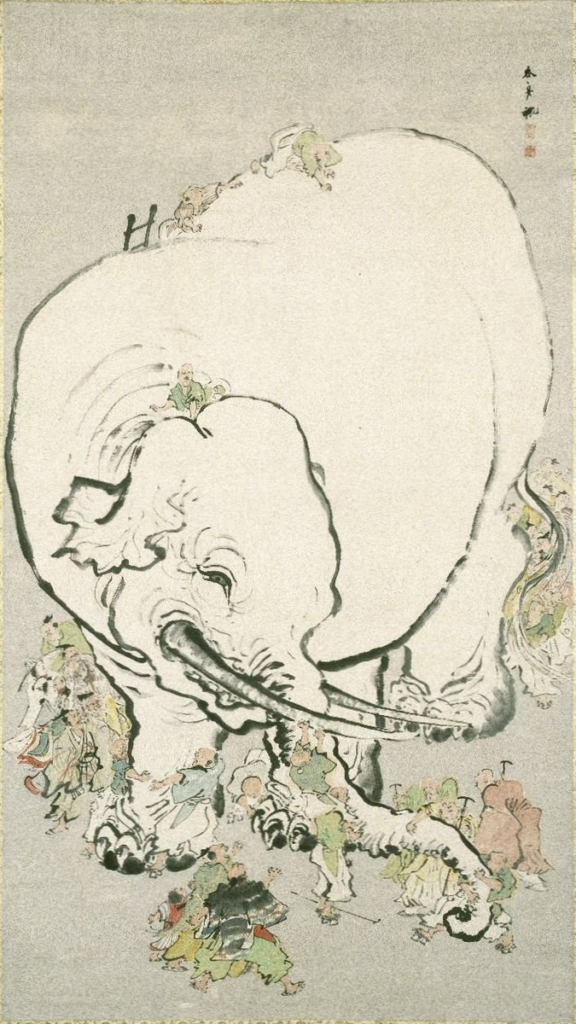The Rashomon effect is a term related to the notorious unreliability of eyewitnesses. It describes a situation in which an event is given contradictory interpretations or descriptions by the individuals involved.

The parable of the blind men and an elephant is a story of a group of blind men who have never come across an elephant before and who learn and conceptualize what the elephant is like by touching it. Each blind man feels a different part of the elephant’s body, but only one part. The moral of the parable is that humans have a tendency to claim absolute truth based on their limited, subjective experience as they ignore other people’s limited, subjective experiences which may be equally true.
Point of view, the Rashomon effect, and the allegory of the blind men and the elephant are powerful literary concepts that explore the subjectivity of human perception and the complexity of truth. These elements frequently appear in fiction to challenge readers’ understanding of events, characters, and the world itself. This essay delves into the significance of point of view, the Rashomon effect, and the blind men and the elephant allegory in fiction, highlighting how they provide nuanced perspectives and contribute to the richness of storytelling.
- Point of View in Fiction:
In literature, point of view refers to the narrative perspective from which a story is told. It determines the reader’s access to information and shapes their understanding of the events and characters. Different points of view can elicit varying emotional responses and judgments from the readers, enhancing the depth and complexity of a story.
Example 1: “To Kill a Mockingbird” by Harper Lee:
In Harper Lee’s classic novel, “To Kill a Mockingbird,” the story is narrated through the eyes of Scout, a young girl. This child’s perspective provides a unique lens through which readers witness the racial prejudices and injustices prevalent in the 1930s American South. Scout’s innocence and lack of bias allow the audience to see the world from a fresh and untainted viewpoint, provoking empathy and understanding.
- The Rashomon Effect in Fiction:
The Rashomon effect is the phenomenon where multiple individuals recounting the same event present contradictory and often subjective versions of the truth. In fiction, this technique is employed to explore the complexities of human perception and the subjectivity of reality.
Example 2: “Rashomon” by Akira Kurosawa:
The term “Rashomon effect” finds its origin in Akira Kurosawa’s iconic film “Rashomon.” The movie revolves around a crime witnessed from different perspectives, each account contradicting the others. As the film unfolds, the audience grapples with the elusive nature of truth and the intricate interplay between memory, self-interest, and perception.
- The Blind Men and the Elephant Allegory in Fiction:
The allegory of the blind men and the elephant is a metaphorical tale that illustrates the limitations of individual perspectives. Each blind man touches a different part of the elephant and forms a distinct understanding of the animal, leading to conflicting descriptions. In fiction, this allegory is used to explore the complexity of truth and the need for diverse viewpoints to approach a complete understanding.
Example 3: “The Blind Assassin” by Margaret Atwood:
In Margaret Atwood’s “The Blind Assassin,” the novel weaves together different narratives, reflecting the blind men and the elephant allegory. The story comprises the personal memoir of an elderly woman, newspaper clippings, and a sci-fi novel written by the protagonist’s sister. Each layer adds new dimensions to the characters and events, emphasizing the subjectivity of truth and the ever-shifting nature of perspectives.
Conclusion:
Point of view, the Rashomon effect, and the blind men and the elephant allegory are potent literary devices that challenge readers’ perceptions of truth and reality. In fiction, these elements are skillfully employed to explore the multifaceted nature of human experiences and encourage empathy and understanding. By acknowledging the subjectivity of viewpoints and the complexities of interpreting events, writers can craft captivating stories that resonate deeply with their audience and invite reflection on the intricacies of the human condition.
Leave a Reply